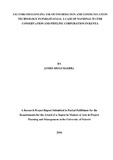| dc.description.abstract | The use of ICT is embraced to meet objectives and targets of an organization in order to achieve beneficial and add value to recipients. This study was required to investigate factors influencing use of Information and Communication Technology in government parastatals with a focus on the National Water Conservation and Pipeline Corporation (NWCPC) offices within Kenya. Objectives that guided this study were; to investigate the influence of staff training on the use of ICT, to assess the influence of ICT funding on the use of ICT, to determine the influence of the availability of ICT facilities on the use of ICT and to assess how staff resistance to change influences the use of ICT at NWCPC. The input variables were categorized into elements for success and output variable were categorized into organizational and technological benefit. This reviewed documented literature from both developed and developing nations and other studies done on local context on e-Government. This study focused on four key factors that influence use of ICT in government parastatals, they include; staff ICT training, ICT funding, availability of ICT facilities and staff resistance to change. The target population for this research was 410 NWCPC staff at their headquarter office. Sampling design was considered in selecting respondents who participated in the study. Descriptive survey was used in collecting data by administering questionnaire. The research used primary sources to collect data and questionnaires were administered randomly to 133 employees of the authority. A total number of 108 respond and this constituted to 81.2% of the sample size. The study adopted stratified sampling technique to sample the respondents for the study while simple random sampling method was used to select employees from 133 respondents. The study targeted Top Management, Technical and Operational staff members of the Authority. Collected data was analyzed and explored using Statistical Package for Social Sciences (SPSS), descriptive analysis, correlation analysis and frequency tables were used in data analysis. The output was represented using frequency tables centered on the study objectives. The study discovered that ICT has not been fully tapped in government parastatals to enable them realize maximum benefits. However, the study recommended that organization management should thoroughly scrutinize an ICT product to establish its suitability in specific geo-cultural contexts and its effectiveness in enhancing job performance at a specific workplace. To this end, the study recommended that; there is need to ensure that all workers are trained on how to use ICT facilities, adequate funds should be set aside by government to facilitate ICT implementation and ICT legislations and regulations should be formulated and integrated in the organization‟s laws and policies to give it a binding and more authoritative touch. | en_US |



